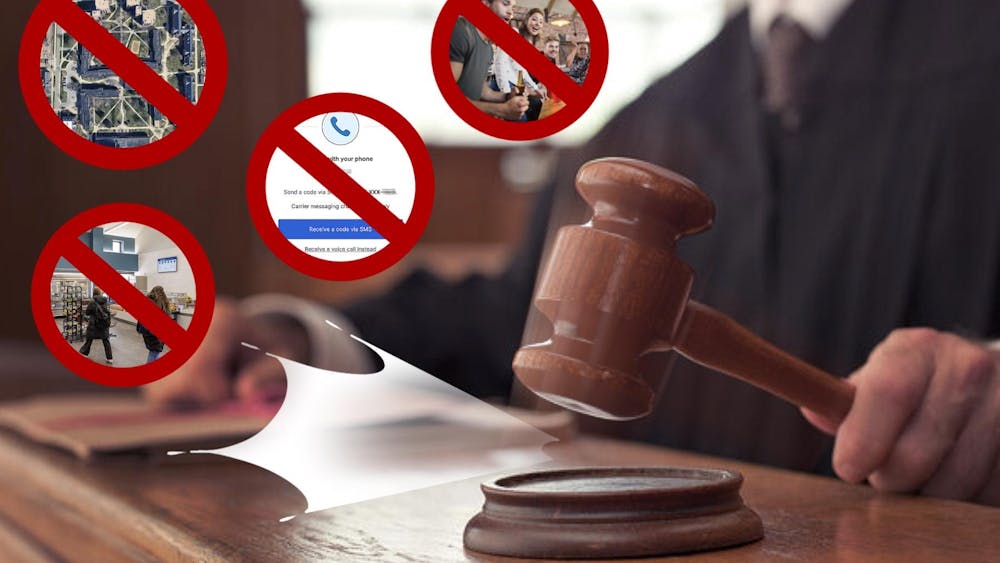Universities face a problem with free expression and civil dialogue on campuses nationwide, and Notre Dame is no exception. The student body and administration must take expansive steps to creating a culture of robust and constructive disagreement. The first step should be to recognize that the academic journey toward truth requires uncomfortable and challenging conversations, disassociating ourselves from the contemporary (often reactionary) telos of comfort.
In a recent Center for Social Concerns survey on Notre Dame campus attitudes, students were asked whether campus climate discourages individuals from freely speaking their opinions. A surprising 66% of Notre Dame students agreed with the statement. For perspective, a university, the central hub of the marketplace of ideas, should strive for that number to be zero.
The University must take an active role in promoting campus dialogue. The first several weeks on campus are the most formative in setting expectations of campus culture. From the first days on campus, the University should inculcate students into an atmosphere of civil disagreement. Welcome Weekend should include explicit calls to de-bias, starting with informing students of the ways cognitive biases operate. The Moreau First Year Experience curriculum must actively promote disagreement. Political conversations and disagreement should be at the forefront of the Moreau experience, and disagreement should have a more active role throughout the entire year.
Professors should foster disagreement in classrooms, not only because of the virtue of civil dialogue but because of its ability to reinforce learning. As an economics student, each course I have taken has potential to spur debates on pertinent topics, yet no course has allowed students to dive deep into those disagreements with each other. Professors can and should devote class time to group conversations — which should start with each student explicitly stating their current views, including areas of uncertainty, thus giving students opportunities to engage with different perspectives. No one can shy away.
Departments can and should support this process. The Department of Economics, for instance, is uniquely situated to be the first department to make meaningful action due to the nature of the material. Tradeoffs should not only be learned through didactic lectures, devoid of meaningful relation to real-world decision making, but should be debated and weighed through conversations among students. Professors should be taught methods of incorporating these conversations into their courses. For dedicated students, the Economics department should consider creating an undergraduate fellows program for engagement in economic theory.
Ultimately, though, students create culture. Conservatives, unsurprisingly, were 2.5 times more likely to strongly or very strongly agree that students cannot speak freely on campus. There is a tendency among liberals to conflate political beliefs with personal morals and, simultaneously, a tendency among conservatives to conflate personal criticism with political attacks. These tendencies dually explain the divergence between conservative and liberals on feelings of open expression.
Liberals and progressives must expand the scope of the tolerance they correctly practice to include tolerance of political disagreement. Just as context shapes an individual’s chance of success, so too does context shape an individual’s political thought. Political beliefs should be met with understanding and charitable interpretation, not an automatic assumption of bigotry and moral inferiority.
Conservatives, themselves, should embrace the individualism they espouse and fight the temptation to be offended by being the dissenting voice. Conservatives must welcome the discomfort of disagreement; the “silent majority” is only silent insofar as conservatives remain silent.
We can harness the power of the hall communities. Individuals should work with their rectors and hall presidents to host occasional Bridge-style events to discuss politics. I have started hosting these in Duncan to great success, and I encourage readers of this article to do the same.
If you are ready to engage in uncomfortable conversations, BridgeND will be hosting a discussion series with free food. Each discussion will place individuals at tables to create ideological diversity. The first will center on abortion, the next on race and the last on gender and identity. These are three of the most controversial issues of our time, and they are, therefore, three topics most in need of deep, but civil, disagreement. Let’s embrace the discomfort.
Junior Gregory Miller is an ACMS and economics major from Duncan Hall and is co-president of BridgeND.
BridgeND is a multi-partisan political club committed to bridging the partisan divide through respectful and productive discourse. It meets on Tuesdays at 5 p.m. in the McNeill Room of LaFortune Student Center to learn about and discuss current political issues, and can be reached at bridgend@nd.edu or at @bridge_ND on Twitter.
Confront our free expression problem
The views expressed in this column are those of the author and not necessarily those of The Observer.









